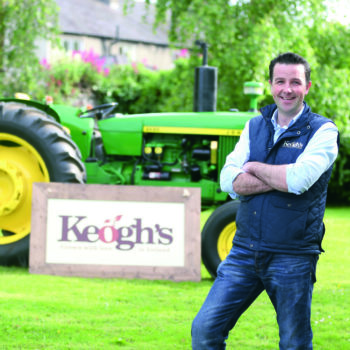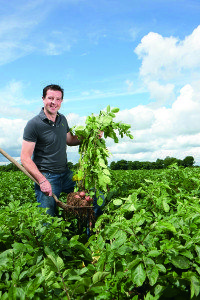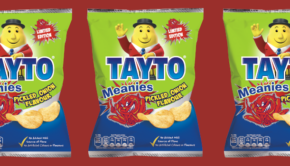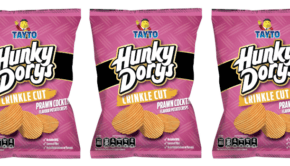Dig in!

Faced with a declining fresh potato market, the over 200-year-old Keogh’s Farm demonstrated a true creative and commercial flair, with the result that the company faces a vastly different fortune today. Gillian Hamill caught up with Tom Keogh of Keogh’s to learn more about they managed to pull off this impressive feat
22 April 2016
Hard as it may be to believe, not so long ago the writing appeared to be on the wall for the humble home-cooked spud. Rival carbs such as pasta and rice were viewed by many consumers as quicker and easier to cook than the traditional Irish dietary staple, with the result that between 2002 and 2012, fresh potato consumption in Ireland fell by around 50%.
Faced with this dilemma, Keogh’s, the north county Dublin potato farm in existence for over 200 years, realised it would need to act. A stance that led to the business diversifying into the crisp sector, where it now holds 5% market share according to Nielsen data. What’s more, Keogh’s generates an annual turnover of €3.5 million.
Finding a solution
“As young farmers coming into the family business – myself, my brother and my cousin – we needed to do something about it,” says Keogh’s MD Tom Keogh. “The crisps took a long time to get off the ground and came about directly as a result of the fall in fresh potato sales.”
The seed that would eventually evolve into the Keogh’s crisps brand was actually first sown at a wedding – one which led to new beginnings for more than just the happy couple! “I identified an opportunity in America to sell fresh potatoes,” Keogh says. “I remember being over there at a wedding one time and I mentioned fresh potatoes to a couple of people and everybody wanted to buy Irish potatoes. I said ok, this is fantastic,” he recalls. “We’re going to grow the potatoes in Ireland and ship everything out to the USA and all our problems are going to be solved.”
This plan went nowhere near as smoothly as Keogh had originally imagined however. “The next step was to get in touch with distributors over there,” he says. “I contacted some of them and sent them samples but the samples didn’t even make it to the distributors, they were sent straight back to me from the Department of Health. It then became very apparent that the importation of fresh potatoes into the country was banned.”
Perseverance pays off
Not to be deterred, Keogh was determined to find a solution. Ireland’s Department of Agriculture was brought on board and the problem thrashed out with plant health officials but “nothing could be done”.
These talks bore fruit in the end though. “It was actually during one of those conversations, that they said, ‘Mr Keogh, why don’t you cook your potatoes, because if you cook your potatoes you don’t have to talk to us, you just bypass all of this red tape’.” Describing this 2006 realisation as a “light bulb moment”, Keogh says, “it started me thinking differently. I needed to add some value to the product; we needed to cook our potatoes in some way and crisps were top of the list for me. Number one, they have a great shelf life, they were growing in sales and the popularity of premium crisps was growing all the time…and I like crisps,” he laughs.

Tom Keogh
Voyage of discovery
The decision led Keogh on a proper voyage of discovery across the globe. “I knew nothing about crisps, absolutely nothing,” is his candid confession. “I loved farming and literally stepped off a tractor and decided to go and try to find out how to make crisps and that took me everywhere.”
The expedition didn’t only teach Keogh how to physically make crisps. His dedication and unwillingness to take short-cuts throughout his market research also ensured he had realistic expectations. Before long, he knew the mainstream market was not for him. “I visited factories and talked to people from New Zealand to Scandinavia, to mainland Europe, into America.” Throughout these visits, Keogh was all the time learning more. “I got to a point where I realised I couldn’t enter the market as a mainstream crisp,” he says. “If I did that, I’d be dead overnight. They’d wipe me up.” Instead he realised, “I needed to enter the market with something special so I wanted to find out how we could make the best crisp in the world and that’s what we did.”
A world first
All in all, he says, “it probably took about four years to pull together,” and by summer 2011, Keogh’s had converted a former potato store into a high-grade BRC glass A crisp factory. “My first fryer came from an Amish community in Pennsylvania, in it went and we started cooking crisps that September,” says Keogh. His first customer was the well-known local supermarket, JC’s in Swords and his first large customer was Superquinn. This led to another impressive first. “We were supplying potatoes to Superquinn under the Keogh’s brand and we launched the crisps under the same brand. We were the first people in the world to do that, to actually launch a potato and a crisp under exactly the same brand, from the same farm.”
A new, previously unheard-of planogram followed with Keogh’s crisps being sold in Superquinn’s fresh potato section as “there was no space in the crisps section. People could buy a bag of Keogh’s crisps and a bag of Keogh’s potatoes actually side by side in the same section and it completely took off. Within the first year, we had almost double the sales of our nearest competitor.”
This achievement was all the more impressive, given that at the time of launch, Keogh’s was 20% dearer than any other premium crisp, with a RRP of €2.49 and the next dearest priced at just over €2. Keogh is unrepentant about this bold move, noting: “In order for me to use premium oils, to use provenance seasonings and do everything correctly and the way I wanted to do it, I had to charge more and I did.” While some people “didn’t think the product would sell”, this pricing strategy was crucial for the fledgling crisp business. “I made that decision because I actually didn’t have the background financial support to lose money at any stage. I needed to make money every day to get the business off the ground. Thankfully, people bought into it,” and today as the business’ scale has grown, it’s “pretty much price-matched” with competitors.
Next up were discussions with Tesco, Musgrave Group and Dunnes Stores, with the crisps gaining listings with Tesco and Musgrave at “pretty much the same. It was absolutely fantastic and I suppose up until that point I never really had a relationship with these retailers and you were always a bit afraid about dealing with big retailers,” Keogh admits. However the supermarkets’ strategy of giving Keogh’s “small local listings” with 10 local Tesco stores and 14 SuperValus with Musgrave Group, worked well for the producer. “We really looked after those stores,” says Keogh. By holding tastings in the stores every weekend and gaining customer feedback, “we could prove to the retailers that we were getting a good rate of sale.” The result of this steady groundwork was that “every few months, we were getting a few more stores and a few more stores so we went from there domestically.”
Export prestige
A lucky break soon followed within the lucrative exports market. “Our first export customer was pretty much the best food retailer in the world, Dean & DeLuca in New York.” Fortunately for Keogh’s, Dean & DeLuca’s buyer happened to be in Ireland the Christmas they launched. She walked into a Superquinn, picked up a bag of Keogh’s and promptly decided they were “the best crisps she had ever tasted”. She called up Keogh’s and secured a listing for the premium New York food hall. An extremely fortunate turn of events for the new crisp manufacturer. As Keogh points out: “From an export point of view, once you tell people that Dean & DeLuca are selling your crisps, they’ll start to listen.” The crisps brand is now stocked in premium food halls which are looking for “a clear point of difference” in up to 14 countries, including Shanghai, Beijing, Switzerland, Germany, France, the UK, and most recently, Singapore.
When it came to exports, Keogh says Ireland’s reputation as the green food island, a message successfully spread by Bord Bia, definitely helped the company and “it’s something that Irish food producers really need to capitalise on a bit more,” he says. “But there’s a huge responsibility in it because when we are marketing ourselves overseas, we pretty much have one chance at this so if you go in there and mess it up, you mess it up for everybody.” What’s more, he adds: “I definitely think there’s other countries are envious about what we’ve done with Origin Green and I think the next step with that is to actually put that on pack, to get consumers buying into it.” The potential rewards are definitely worth the effort involved in cracking the export market, according to Keogh. A retailer in Germany “might trial a product in 500 stores, whereas in Ireland, success would be a listing in 100 stores so the scales are completely different and the opportunities out there are amazing,” he says.
In fact, one of the best performing export markets for Keogh’s currently is the UAE, in both Abu Dhabi and Dubai, where wealthy consumers are snapping up the brand. “We are air freighting potatoes to the retailers in Dubai; I never thought for the life of me I’d ever be doing that but we would do that twice a week,” Keogh says. “They’ll be on the shelf quicker in the supermarkets in Dubai quicker than they’d be on the shelf in Ireland; it’s amazing.”
Learning curve
This type of activity all marks a huge change for Keogh and the Keogh’s traditional family business. “Working with retailers, for us it was something completely new,” he says. “Growing up in the business on the farm here, our customers were the Dublin wholesale market, it was Smithfield and the wholesalers. Everybody would be in there early every morning hustling to sell their product and then back out to the farm in the afternoon. I suppose that’s all dying now; that’s disappearing and you have to deal with the retailer groups. It was definitely a learning curve for us but I think we can really pride ourselves on our customer service.”
While in some ways the business has evolved hugely, one fact that hasn’t changed is that potatoes remain their “bread and butter” with a sales breakdown of approx. 70% potatoes to 30% crisps. “Potatoes still take up most of my day,” says Keogh, “but it’s good, it’s what I enjoy. What I enjoy most is actually being out on the field or being in the factory with the lads.”
Busy days
At the moment, 35 people work within the potatoes side of the business, with 27 on crisps. Keogh plans to have another staff eight come on board within crisps this year due to the multipack expansion, bringing total employment to around 70 by the year-end. “A lot of local people are employed here which is fantastic,” says Keogh. “Back in 2011 when we launched Keogh’s Crisps there was huge unemployment in this area; pretty much everybody was involved in construction. If you weren’t farming, you were building.” Many former builders now work at Keogh’s “and they’ve reinvented themselves and are working in the food industry”. That must be a great feeling we ask, but Keogh gives a typically down-to-earth response: “It is great, but you don’t even get a chance to think about it,” he says. “It’s just head down, you’re so busy you just drive on.” And a short while ago his schedule got a lot more hectic, with the birth of his first-born son. “I thought it was busy but we had our first baby four weeks ago, a little baby boy, oh my god, you just really learn how to prioritise and focus.” On this topic, ShelfLife congratulates him for his remarkably coherent answers, when we ask about sleep deprivation and he admits: “Yep, I think I got three hours last night.”
Potato innovation
Back to spuds however, and the new dad informs us that Rooster is the number one top seller – “probably about 80% of what we sell. It’s huge. It was actually developed by Harry Keogh (no relation) in Teagasc in Oak Park back in 1992 and we were one of the first people to grow it. I remember at the time people were saying, ‘oh god, would I buy a red potato?’, now it’s second nature for them.” The floury fluff factor that Irish consumers love, stemming from higher dry matter, was a key ingredient in the Rooster’s success, alongside its versatility.
While red potatoes may have seemed outlandish at the time, Keogh’s flair for innovation certainly didn’t stop there. In a bid to “revamp the health aspect of potatoes,” Keogh’s launched Selenium-enriched Selena potatoes back in 2009, which are now stocked in SuperValu. This followed the publication of a study by University College Cork which found that the amount of the selenium nutrient had drastically declined here due to the fact that Ireland no longer imports as much wheat as it historically did from Canada, where soils are extremely rich in selenium. Keogh’s spotted an opportunity and decided to start enriching its soils with selenium, an initiative that took around three years to properly develop. Subsequently it managed to increase the selenium in these potatoes by “multiples of hundreds of percent and we got it to the point where an average daily consumption of potatoes represented over a third of an individual’s daily intake of selenium”. Subsequently, the product is now selling well and has brought the humble spud into the functional foods category.
Health and convenience
While the selenium-enriched potatoes help address consumers’ perception that potatoes are unhealthy, this view does not hold much truck with Keogh in any case who believes potatoes are a superfood, stating: “There’s more vitamin C in a potato than an orange. There’s more fibre than there is in an apple and more potassium than in a banana.”
Another product developed by Keogh’s to counteract some of the negative perceptions surrounding potatoes was microwavable Keogh’s Easy Cook Baby Potatoes, designed to appeal to consumers seeking out convenience. The first Easy Cook potato launched back in 2008/2009, “and nobody bought it,” says Keogh in his characteristic straight-forward manner. “We had to go back to the drawing board and what we did was, we redeveloped the pack, we launched the Keogh’s brand and we went into the supermarkets and we stood there, day in and day out, telling consumers what it was because Irish consumers do not read packaging, I’m convinced,” he laughs. After these intensive efforts, “slowly but surely, sales started to increase and over the last four years, that has grown to become our biggest selling product”. An impressive turnaround in performance and it’s clearly this type of perseverance and lateral thinking that resulted in Keogh scooping the Marketer of the Year Award for 2015; an accolade of which he is justifiably proud.
Sales turnaround
Importantly, this fresh-thinking innovation has impacted sales. “For the first time, that I’ve ever seen, we actually had an increase in the consumption of fresh potatoes in 2014 and that increase continued in 2015, which is fantastic. “We’ve turned what was an 11% decline year-on-year up to around 8% growth last year and that’s not us, that’s market-wide; everybody has been working hard to try to achieve that. On this subject, Keogh also praises the efforts of Bord Bia through its ‘Potatoes – More than a bit on the side’ consumer campaign.
While the horizon now fortunately appears much brighter for fresh potatoes, we were interested to hear Keogh’s thoughts on whether crisps would be affected by the increasing consumer move towards health-conscious options. His answer is two-fold. Firstly, he says he sources “the best possible ingredients for every single stage, including a special oil from the South of France which is 80% mono-saturates and quality local produce such as David Llewellyn’s vinegar – which are all added in a “really natural process. It costs an absolute fortune, our seasonings probably would be four or five times dearer than they would be on standard everyday crisps but to me, you get that difference when you taste the product.” For these reasons he believes Keogh’s Crisps are “healthier than a lot of other products on the market. Am I worried that health-conscious consumers will buy less of our crisps?,” he asks. “Not really. The reason being that we’re selling an adult crisp and it’s a treat crisp that you will eat in the evening at home watching a DVD with your husband or wife, it’s not something that you will probably throw into a lunchbox and give to your children every day.” In an enticing teaser, he adds that he has some fantastic ideas around healthy foods and snacks in years to come.
NPD strategy
At the moment however, Keogh’s has its new product development (NPD) strategy in place for the next five years. The company is currently working on new flavours and “innovative crisp products coming out in 2017 that haven’t been seen on the market before.” Due to the success of its multipacks, at the time of interview, Keogh noted: “We have two new multipack SKUs coming on line in two weeks, one pack full of Cheese and Onion and one pack full of Salt and Vinegar; it’s very simple but 60% of the Irish market is Cheese and Onion multipacks so we want to go after that.” A new flavour is also coming out mid-summer, of which Keogh says, “we’re working with another fantastic Irish artisan producer to get the core ingredient”.
While further details surrounding these products cannot be released as yet, we’re curious to learn if Keogh believes Irish consumers’ tastes have become more adventurous in recent years. “Yes and no,” is his circumspect answer. “I think Irish consumers would think of themselves as quite adventurous when it comes to flavourings but actually when they make the purchase decision, they’ll go for the steady eddy. For example in the Irish market, there’s over 60% of the market is Cheese and Onion and when you actually look at the breakdown of the more specialised flavours, they’re absolutely minuscule. It’s very interesting because from time to time we would do competitions for consumers to suggest a flavour. It’s unbelievable; we’ve probably done about three of them at this stage and every time the winner has been Bacon & Cabbage and we’re looking at it going, oh my god, Bacon & Cabbage, can people not be a bit more creative?,” he jokes. Unsurprisingly, he has no imminent plans to release a Bacon & Cabbage flavour.
Family advantages
Bacon & Cabbage flavour aside, the future certainly appears bright for this hard-grafting family business. “There’s a lot of different dynamics at play,” when working in a family company, Keogh says. “There are five family members here at the moment; there’s my father, my uncle, myself, my brother Ross, my cousin Derek and we each have our areas of expertise and I suppose that’s something that’s key to a family business. People need to bring something to the table and we’ve been lucky in that regard in that everybody works extremely hard. There’s definitely no slackers and we all can add value to the business. And I think once you’re adding value, once everybody’s moving in the same direction, family businesses are amazing and the competitive advantages that they have outweigh any of the disadvantages; big time.”
Having a serious challenge that you need to overcome, such as a declining potato market, can also be no bad thing in the long run, according to Keogh. “All you need is that little bit of tenacity and hunger and a challenge that needs to be overcome and my god, you learn things,” he says. “I could sit in a classroom all day long and I wouldn’t learn anything but if you told me I was going to die tomorrow unless I knew what [the teacher] was talking about, I’d learn quick. So I think we’re very quick learners here and definitely to develop the brand in the way we’ve done, to bring the business to where it is in such a short period, it took an awful lot of work. We made a huge amount of mistakes but we made them once, and we learnt from them and we calmly moved on. We’re now in a position today whereby it’s not just family, I’ve got a management team here of really great people and to be working side by side with these people, I never thought I’d have people of this type in our business. It’s fantastic to have them there and it really gives you reassurance that things are going to be ok.”



 Print
Print




Fans 0
Followers